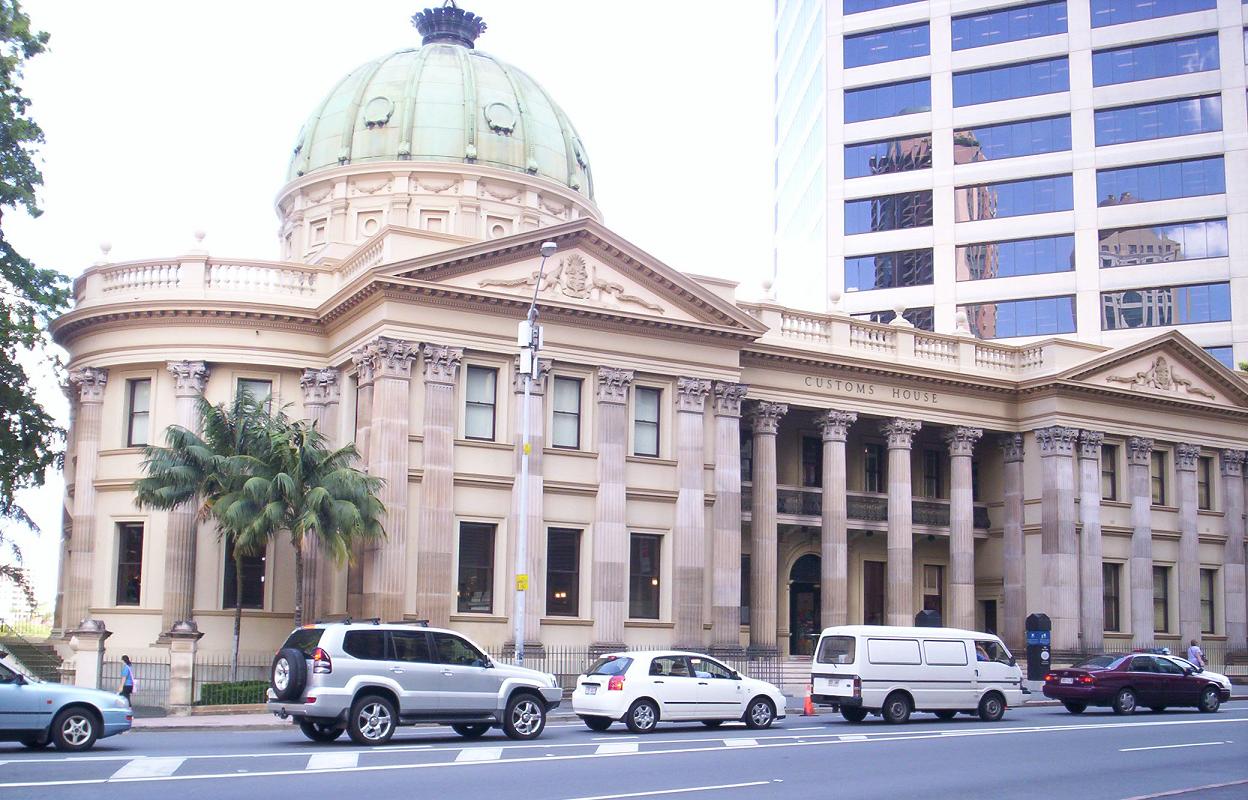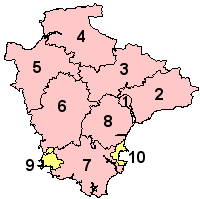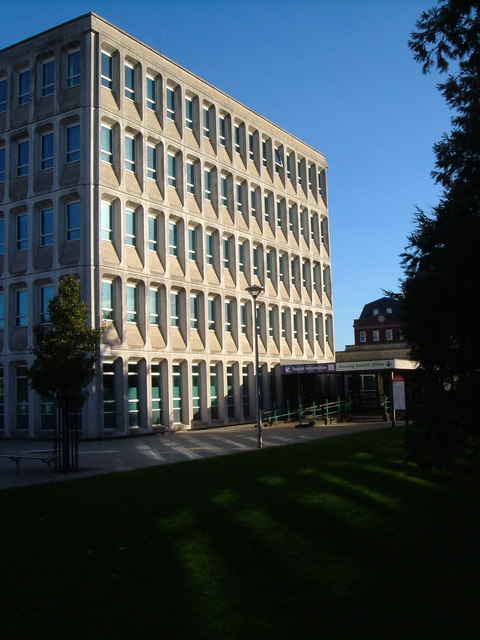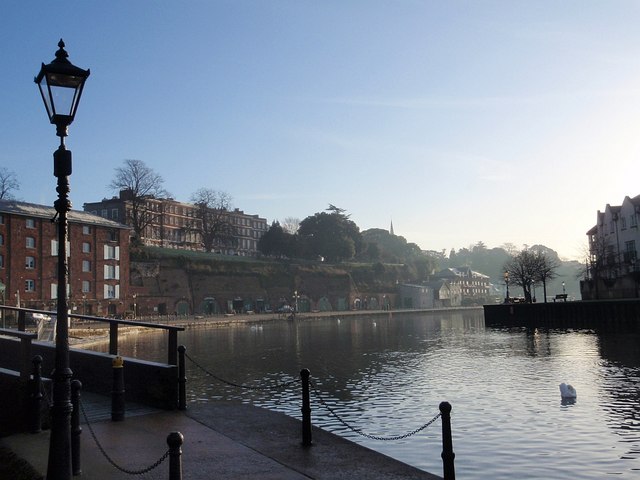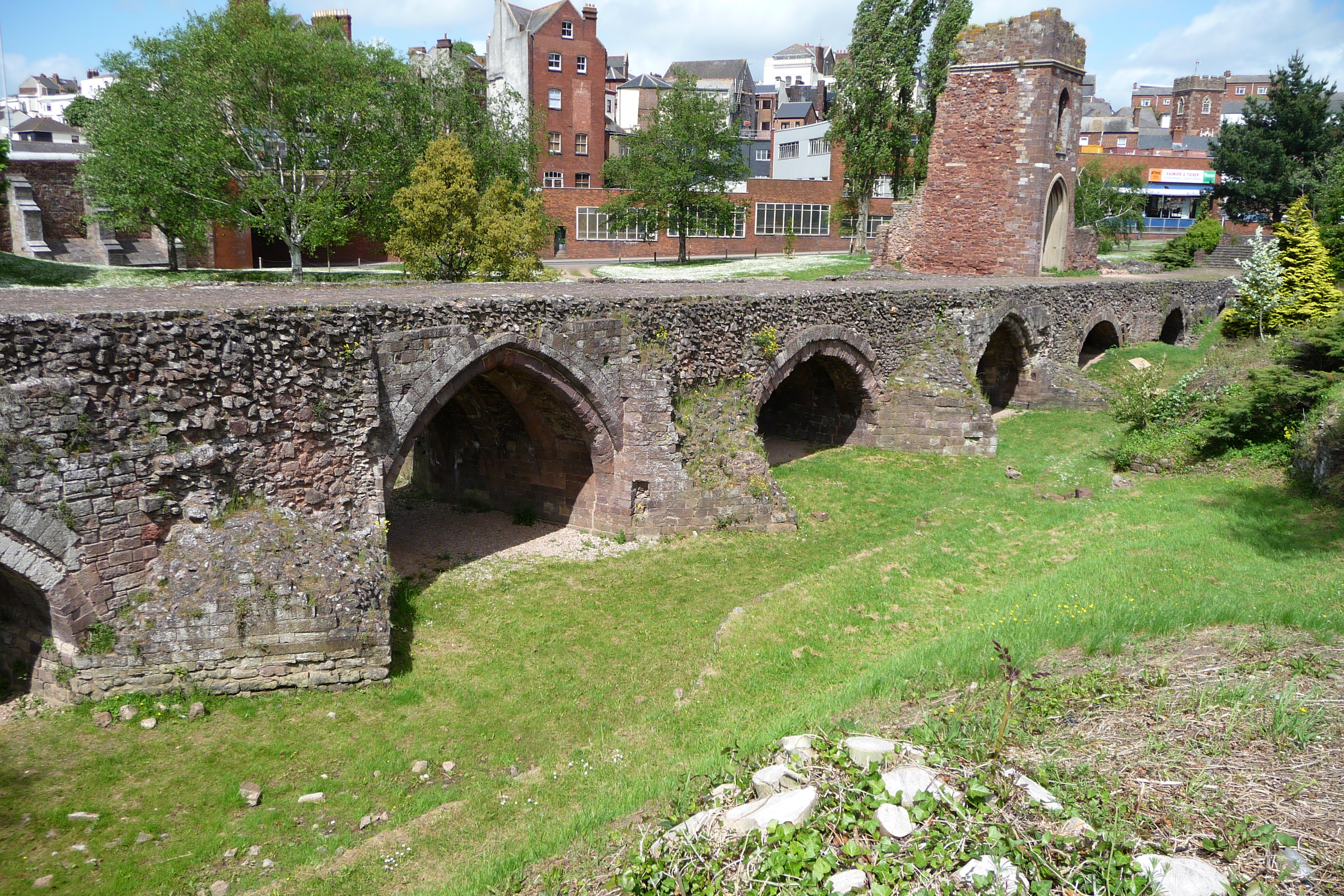|
Custom House, Exeter
This Custom House at Exeter was the first in England built for that purpose. It was operated by HM Customs until 1989. Like other former custom houses in the United Kingdom, it now serves as a visitor attraction. It was built in the early 17th-century and has been Grade I listed since 1953. History The Custom House was built in 1680-81 in response to the increasing trade seen at Exeter Quay, particularly of the woollen cloth industry. Though the quay had existed since Roman times, the construction of the Exeter Ship Canal in 1564-66 led to a considerable increase in trade. The Custom House was built by Richard Allen for a cost of £3,000. Believed to be the oldest brick building to survive in Exeter, Historic England recorded that the building's "Renaissance-inspired facade and magnificent plasterwork, advanced joinery detail, early use of brick and the centralised double-depth plan are of the first importance in illustrating the arrival of a national or court style to Devo ... [...More Info...] [...Related Items...] OR: [Wikipedia] [Google] [Baidu] |
Custom House
A custom house or customs house was traditionally a building housing the offices for a jurisdictional government whose officials oversaw the functions associated with importing and exporting goods into and out of a country, such as collecting customs duty on imported goods. A custom house was typically located in a seaport or in a city on a major river, with access to an ocean. These cities acted as ports of entry into a country. Due to advances in electronic information systems, the increased volume of international trade, and the introduction of air travel, the term "custom house" became a historical anachronism. There are many examples of buildings around the world that were formerly used as custom houses but have since been converted for other uses, such as museums or civic buildings. As examples, the former Alexander Hamilton U.S. Custom House in Manhattan, New York, (now the George Gustav Heye Center) presently houses a branch of the National Museum of the American ... [...More Info...] [...Related Items...] OR: [Wikipedia] [Google] [Baidu] |
Exeter Ship Canal
The Exeter Ship Canal, also known as the Exeter Canal is a canal leading from (and beside) the River Exe to Exeter Quay in the city of Exeter, Devon, England. It was first constructed in the 1560s predating the " canal mania" period and is one of the oldest artificial waterways in the UK. History At the start of Exeter's history, the River Exe was tidal and navigable up to the city walls enabling it to be a busy port. In the 1270s or 1280s, the Countess of Devon, Isabella de Fortibus, built a weir across the river to power her mills (this weir is remembered in the name of the nearby suburb Countess Wear). This had the effect of cutting off Exeter's port from the sea and damaging its salmon fisheries. In 1290, trade with Exeter's port was restored, only to be blocked by a new weir built in 1317 by Hugh de Courtenay, 9th Earl of Devon (Isabella's cousin), who also built a quay at Topsham. Because of the blockages on the river, boats were forced to unload at Topsham and the ear ... [...More Info...] [...Related Items...] OR: [Wikipedia] [Google] [Baidu] |
Custom Houses In The United Kingdom
Custom, customary, or consuetudinary may refer to: Traditions, laws, and religion * Convention (norm), a set of agreed, stipulated or generally accepted rules, norms, standards or criteria, often taking the form of a custom * Norm (social), a rule that is socially enforced * Customary law or consuetudinary, laws and regulations established by common practice * Customary (liturgy) or consuetudinary, a Christian liturgical book describing the adaptation of rites and rules for a particular context * Custom (Catholic canon law), an unwritten law established by repeated practice * Customary international law, an aspect of international law involving the principle of custom * Mores * Tradition * Minhag (pl. minhagim), Jewish customs * ʿUrf (Arabic: العرف), the customs of a given society or culture Import-export * Customs, a tariff on imported or exported goods * Custom house Modification * Modding * Bespoke, anything commissioned to a particular specification * Custom car * ... [...More Info...] [...Related Items...] OR: [Wikipedia] [Google] [Baidu] |
Grade I Listed Buildings In Devon
The county of Devon is divided into ten districts. The districts of Devon are Exeter, East Devon, Mid Devon, North Devon, Torridge, West Devon, South Hams, Teignbridge and the unitary authorities Plymouth and Torbay. As there are 427 Grade I listed buildings in the county they have been split into separate lists for each district. * Grade I listed buildings in East Devon * Grade I listed buildings in Exeter * Grade I listed buildings in Mid Devon * Grade I listed buildings in North Devon * Grade I listed buildings in Plymouth * Grade I listed buildings in South Hams * Grade I listed buildings in Teignbridge * Grade I listed buildings in Torbay * Grade I listed buildings in Torridge * Grade I listed buildings in West Devon See also * Grade II* listed buildings in Devon Grade II* listed buildings in Devon are listed buildings in the county of Devon, England, that are particularly important buildings of more than special interest. The county of Devon is divided into ... [...More Info...] [...Related Items...] OR: [Wikipedia] [Google] [Baidu] |
Medieval English Wool Trade
The medieval English wool trade was one of the most important factors in the medieval English economy. The medievalist John Munro notes that " form of manufacturing had a greater impact upon the economy and society of medieval Britain than did those industries producing cloths from various kinds of wool." The trade's liveliest period, 1250–1350, was 'an era when trade in wool had been ''the'' backbone and driving force in the English medieval economy'. The wool trade was a major driver of enclosure (the privatisation of common land) in English agriculture, which in turn had major social consequences, as part of the British Agricultural Revolution. Among the lasting monuments to the success of the trade are the 'wool churches' of East Anglia and the Cotswolds; the London Worshipful Company of Clothworkers; and the fact that since the fourteenth century, the presiding officer of the House of Lords has sat on the Woolsack, a chair stuffed with wool. Early Middle Ages During ... [...More Info...] [...Related Items...] OR: [Wikipedia] [Google] [Baidu] |
Exeter City Council
Exeter City Council is the council and local government of the city of Exeter, Devon. History Proposed unitary authority status The government proposed that the city should become an independent unitary authority within Devon, much like neighbouring Plymouth and Torbay. The statutory orders to set up the unitary authority were passed in Parliament and a new unitary city council was due to start in Exeter on 1 April 2011. However, following the 2010 general election the new government announced in May 2010 that the reorganisation would be blocked. Boundaries The Local Government Boundary Commission for England published its final recommendations in September 2015 for changes to the wards in Exeter. The aim was to reduce the city's high levels in electoral inequality. The number of wards was reduced to 13; each electing three councillors for a total of 39. Following parliamentary approval, it came into effect at the 2016 election. Wards and councillors The wards of the ci ... [...More Info...] [...Related Items...] OR: [Wikipedia] [Google] [Baidu] |
Exeter Canal And Quay Trust
Exeter () is a city in Devon, South West England. It is situated on the River Exe, approximately northeast of Plymouth and southwest of Bristol. In Roman Britain, Exeter was established as the base of Legio II Augusta under the personal command of Vespasian. Exeter became a religious centre in the Middle Ages. Exeter Cathedral, founded in the mid 11th century, became Anglican in the 16th-century English Reformation. Exeter became an affluent centre for the wool trade, although by the First World War the city was in decline. After the Second World War, much of the city centre was rebuilt and is now a centre for education, business and tourism in Devon and Cornwall. It is home to two of the constituent campuses of the University of Exeter: Streatham and St Luke's. The administrative area of Exeter has the status of a non-metropolitan district under the administration of the County Council. It is the county town of Devon and home to the headquarters of Devon County ... [...More Info...] [...Related Items...] OR: [Wikipedia] [Google] [Baidu] |
Historic England
Historic England (officially the Historic Buildings and Monuments Commission for England) is an executive non-departmental public body of the British Government sponsored by the Department for Digital, Culture, Media and Sport. It is tasked with protecting the historic environment of England by preserving and listing historic buildings, scheduling ancient monuments, registering historic Parks and Gardens and by advising central and local government. The body was officially created by the National Heritage Act 1983, and operated from April 1984 to April 2015 under the name of English Heritage. In 2015, following the changes to English Heritage's structure that moved the protection of the National Heritage Collection into the voluntary sector in the English Heritage Trust, the body that remained was rebranded as Historic England. The body also inherited the Historic England Archive from the old English Heritage, and projects linked to the archive such as Britain from Above ... [...More Info...] [...Related Items...] OR: [Wikipedia] [Google] [Baidu] |
Exeter Quay
Exeter Quay, also known as Exeter Quayside, is a part of the city of Exeter Exeter () is a city in Devon, South West England. It is situated on the River Exe, approximately northeast of Plymouth and southwest of Bristol. In Roman Britain, Exeter was established as the base of Legio II Augusta under the personal comm ... next to the River Exe and the Exeter Ship Canal. It was first used as a port in prehistoric times when a sandstone ledge was used to unload the ships of overseas traders.* However, by 1381 the Countess Weir had blocked the river to shipping. In 1566 a canal was completed to provide access for ships. Over time the number of ships using the quayside increased and so the quay was expanded in the late 17th century. Further expansion occurred in 1830 when a new canal basin was dug. However, in 1840 the railways reached Exeter and the shipping began to decline. No longer used for shipping, the quayside is now mostly used for leisure included in the links bel ... [...More Info...] [...Related Items...] OR: [Wikipedia] [Google] [Baidu] |
Exeter
Exeter () is a city in Devon, South West England. It is situated on the River Exe, approximately northeast of Plymouth and southwest of Bristol. In Roman Britain, Exeter was established as the base of Legio II Augusta under the personal command of Vespasian. Exeter became a religious centre in the Middle Ages. Exeter Cathedral, founded in the mid 11th century, became Anglican in the 16th-century English Reformation. Exeter became an affluent centre for the wool trade, although by the First World War the city was in decline. After the Second World War, much of the city centre was rebuilt and is now a centre for education, business and tourism in Devon and Cornwall. It is home to two of the constituent campuses of the University of Exeter: Streatham and St Luke's. The administrative area of Exeter has the status of a non-metropolitan district under the administration of the County Council. It is the county town of Devon and home to the headquarters of Devon County C ... [...More Info...] [...Related Items...] OR: [Wikipedia] [Google] [Baidu] |
Exeter Custom House And Quay
Exeter () is a city in Devon, South West England. It is situated on the River Exe, approximately northeast of Plymouth and southwest of Bristol. In Roman Britain, Exeter was established as the base of Legio II Augusta under the personal command of Vespasian. Exeter became a religious centre in the Middle Ages. Exeter Cathedral, founded in the mid 11th century, became Anglican in the 16th-century English Reformation. Exeter became an affluent centre for the wool trade, although by the First World War the city was in decline. After the Second World War, much of the city centre was rebuilt and is now a centre for education, business and tourism in Devon and Cornwall. It is home to two of the constituent campuses of the University of Exeter: Streatham and St Luke's. The administrative area of Exeter has the status of a non-metropolitan district under the administration of the County Council. It is the county town of Devon and home to the headquarters of Devon County Council. ... [...More Info...] [...Related Items...] OR: [Wikipedia] [Google] [Baidu] |
Grade I Listed
In the United Kingdom, a listed building or listed structure is one that has been placed on one of the four statutory lists maintained by Historic England in England, Historic Environment Scotland in Scotland, in Wales, and the Northern Ireland Environment Agency in Northern Ireland. The term has also been used in the Republic of Ireland, where buildings are protected under the Planning and Development Act 2000. The statutory term in Ireland is "protected structure". A listed building may not be demolished, extended, or altered without special permission from the local planning authority, which typically consults the relevant central government agency, particularly for significant alterations to the more notable listed buildings. In England and Wales, a national amenity society must be notified of any work to a listed building which involves any element of demolition. Exemption from secular listed building control is provided for some buildings in current use for worship, ... [...More Info...] [...Related Items...] OR: [Wikipedia] [Google] [Baidu] |

